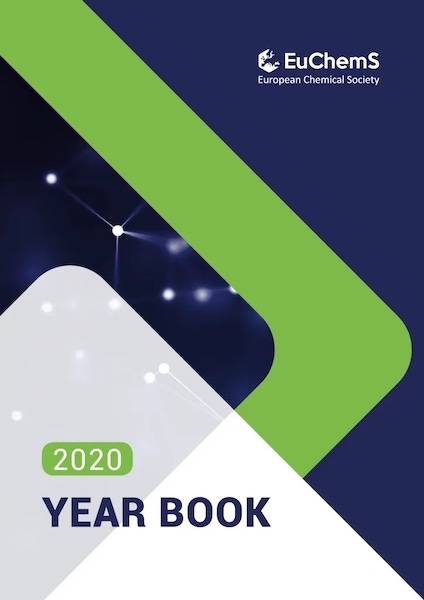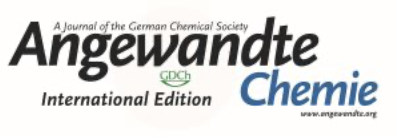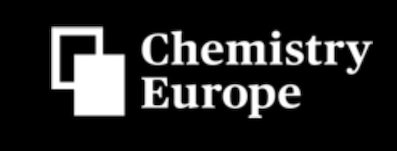Brussels News Update, February 2021

European Highlights, Research, Innovation, Education, Entrepreneurship
First EuChemS @Global Women's Breakfast 2021
On the occasion of the Global Women’s Breakfast 2021 #GWB2021, an IUPAC initiative, the European Chemical Society (EuChemS) organised its first own event on Tuesday, 9 February 2021, from 10:00 to 11:00 CET.
An impressive line-up of speakers from the European Chemistry community engaged with more than 150 attendees on various inclusion-related topics, including work-life balance, building professional networks and STEM education for school-age kids. The recording of the online breakfast is now available on the EuChemS YouTube channel.
Read our full debrief here.
2020: a year to remember or a year to forget?
The EuChemS Year Book 2020 is now available online!
The 2020 Yearbook is a form of a EuChemS annual report which looks back at the activities and achievements carried out by the European Chemical Society and its community over the year. It also offers an insightful overview of EuChemS Professional Networks and their work. Divided between chapters, the Yearbook explores the 2020 initiatives and actions in policy areas, meetings, events and webinars, as well as awards and the activities related to the 50thanniversary celebration of the European Chemical Society.
Read more about it here.
The launch of 'Horizon Europe' strengthens EU R&I goals
On 2 February 2021, the Portuguese Presidency of the Council of the European Union and the European Commission hosted the launch event of ‘Horizon Europe’, the European Union’s most ambitious Research and Innovation framework programme for the 2021-2027 period.
During this online event, the European Commission reaffirmed the important role of ‘Horizon Europe’ for Research and Innovation: the next seven-year framework programme will focus on societal challenges, including public health, population aging, security and defence, as well as pollution and climate change.
Read the full article here.
New ERA Forum for Transition
On 4 February 2021, the European Commission launched the new European Research Area (ERA) Forum for Transition. It is composed of EU Member States’ representatives, and it also includes one representative from each EEA/EFTA country.
The main goal of the ERA Forum for Transition is to provide recommendations to the Directorate-General Research and Innovation (DG-RTD) on the governance structure of the ERA, and on the development of the first ERA policy agenda.
Read the full article here.
Delays to ERC 2021 Work programme and first calls
With the transition from ‘Horizon 2020’ to ‘Horizon Europe’, the new seven-year framework programme for Research and Innovation, the European Research Council (ERC) postponed the publication of the first ‘Horizon Europe’ calls, until the programme is adopted by the European Commission.
Read our full debrief here.
EIC Innovation Launchpad call: €3.5 million awarded to 35 projects
On 5 February, the European Innovation Council (EIC) announced that 35 projects from 10 European countries were selected in its last Innovation Launchpad call. In total, 118 proposals were submitted for this Innovation Launchpad call.
The selected projects include innovations in various sectors, such as railways, artificial intelligence, energy, and much more.
Read the full article here.
ISE’s report on the Precarity of Academic Careers
Initiative for Science in Europe (ISE) released a report on the precarity of academic careers in Europe. As ISE considers that precarity of academic careers is one of the most pressing issues of the research system, the ISE Researchers’ Careers Task Force focused its reflection on the causes for precarity in the academic sector:
- Funding of academic careers;
- Research assessment practices;
- Research grant evaluation.
Read our full debrief here.
2021 IUPAC Distinguished Women in Chemistry or Chemical Engineering Awards
On 11 February 2021, on the occasion of the International Day of Women and Girls in Science, the International Union of Pure and Applied Chemistry (IUPAC) announced the 12 awardees of the IUPAC 2021 Distinguished Women in Chemistry or Chemical Engineering.
EuChemS is proud to see Dr Rachel Mamlok-Naaman, the Chair of the EuChemS Division of Chemical Education, as one of the awardees. On behalf of all of us at EuChemS, we congratulate Rachel Mamlok-Naaman on her award!
Read the full article here.
Consultations & Roadmap
European Commission Public Consultations and Roadmaps
A number of consultations and roadmaps put forward by the European Commission are currently open:
- Industrial emissions – EU rules updated
Public Consultation
Deadline: 23 March 2021 - Pesticides – sustainable use (updated EU rules)
Public Consultation
Deadline: 12 April 2021 - Healthy soils – new EU soil strategy
Public Consultation
Deadline: 27 April 2021 - Climate change – new rules to prevent methane leakage in the energy sector
Public Consultation
Deadline:1 May 2021
European Chemicals Agency (ECHA) public consultations
A number of consultations put forward by ECHA are currently open.
You can take a look at them here.
European Food Safety Authority (EFSA) public consultations
A number of consultations put forward by EFSA are currently open.
You can take a look at them here.
Public consultation on the active substance Limestone
17 March 2021
Public consultation on the active substance Hydrolysed proteins
31 March 2021
Fundings, Nominations & Awards
EURAMET Call for Needs 2021
The European Association of National Metrology Institutes (EURAMET) announced the launch of the 2021 Call for Needs for several topic areas, within the potential European Partnership on Metrology.
Deadline: 22 February 2021, 23:59 CET
Website: https://bit.ly/3jBEtvT
RawMaterials Accelerator
RawMaterials Accelerator introduces start-up teams to potential customers from the EIT RawMaterials partner networks willing to adopt innovations. The programme connects local and national ecosystems to the pan-European network of a pilot and test infrastructure facilities, as well as potential customers.
Deadline (phase 1): 1 March 2021
Website: https://bit.ly/3qhofe1
Call for applications for the ISC3 Innovation Challenge 2021 on Sustainable Chemistry and Renewable Energies
The International Sustainable Chemistry Collaborative Centre (ISC3) Innovation Challenge 2020/2021 addresses innovators from around the world which are active in developing sustainable chemistry solutions linked to renewable energies.
Deadline: 1 April 2021, 12:00 am CEST
Website: https://bit.ly/373FgAG
EuChemS Events
In the current environment and status of COVID-19, some events recognised by EuChemS are being postponed or cancelled.
EuChemS Events calendar is being updated on a regular basis.
If you planned to attend an event, you can check more about it here.
Sustainable Chemistry Lecture Series - SCLS
2 March 2021
Online
Visit the website!
EuSamplePrep Conference
11-12 March 2021
Online event
Visit the website!
Eurovariety 2021
7-9 July 2021
Ljublijana, Slovenia & online
Visit the website!
OTHER EVENTS
18th Hellenic Symposium on Medicinal Chemistry
25 – 27 February 2021
Online
Website: https://bit.ly/3pnQZjQ
Research assessment practices – Precarity in academia webinar series
4 March 2021, 14:00 – 15:30 CET
Online
Website : https://bit.ly/3rThJdR
Research grant evaluation– Precarity in academia webinar series
18 March 2021, 14:00 – 15:30 CET
Online
Website: https://bit.ly/3qm5zKh
ONE – Health, Environment, Society – Conference 2022
21 – 24 June 2022
Hybrid: Brussels, Belgium & online
Website: https://bit.ly/2N6MCga
Read the full BNU newsletter here
EuChemS aisbl - Rue du Trône 62, 1050, Brussels, Belgium; www.euchems.eu. Produced for EuChemS by Nineta Hrastelj, Laura Jousset and Jelena Lazić. This newsletter has been carefully prepared and only contains correct information to the best of EuChemS´ knowledge, however this does not exclude the possibility of existence of incorrect information. EuChemS cannot be liable for the use or misuse of any information, whether correct or incorrect, present at this newsletter. Intellectual property belongs to its rightful owners, always explicitly traceable on each article. Compilation Copyright © 2020 EuChemS
Céline Wittwer, SCS
18.02.2021
EuChemS published the 2020 Year Book
 2020: a year to remember or a year to forget?
2020: a year to remember or a year to forget?
The EuChemS Year Book 2020 is now available online!
The 2020 Yearbook is a form of a EuChemS annual report which looks back at the activities and achievements carried out by the European Chemical Society and its community over the year. It also offers an insightful overview of EuChemS Professional Networks and their work. Divided between chapters, the Yearbook explores the 2020 initiatives and actions in policy areas, meetings, events and webinars, as well as awards and the activities related to the 50thanniversary celebration of the European Chemical Society.
Read more about it here.
"Empowering Diversity in Science: Gender in Academia and Publishing" a virtual symposium
Angewandte Chemie and Chemistry Europe are pleased to announce the upcoming Virtual Symposium on "Empowering Diversity in Science: Gender in Academia and Publishing" as part of the IUPAC Global Women’s Breakfast initiative.
When: Thursday, 25th of February at 15:00 CET (UTC+1)
This exciting event will be moderated by Sandra González Gallardo (Chemistry Europe) and Lisa Pecher (Angewandte Chemie) and will feature a wonderful lineup of speakers:
- Pernilla Wittung-Stafshede (Professor, Chalmers University of Technology and Head of Genie Gender Initiative for Excellence, Sweden) - “Female faculty: Why so few and why care?”
- Julia Trattnig (Consultant, Convelop, Cooperative Knowledge Design GmbH, Austria) - “Who cites whom? Tackling biases in academia”
- Mia Ricci (Publisher, Wiley, USA) – “Committing to a more diverse, equitable, and inclusive publishing environment”
To register for this free event, please click here. We encourage you to save the date in your calendar. For more upcoming virtual events from Chemistry Europe please visit the Chemistry Europe Hub or Chemistry Views.
Céline Wittwer, SCS
01.02.2021
Chemistry Travel Award 2021 - Application now open!
Through the «Chemistry Travel Award», contributions towards the cost of participation at an international conference in the chemical sciences are granted to selected PhD students. The award is sponsored by the Platform Chemistry of the SCNAT and the Swiss Chemical Society. The registrations for the awards are now open.
The deadline is March 31st 2021. All the informations are available on the website chem.scnat.ch/travel_award.
Céline Wittwer, SCS
01.02.2021
SCNAT Newsletter, January 2021
Prix Museum 2020 geht in den Thurgau
Das Naturmuseum Thurgau zeichnet sich in der Wissensvermittlung wie in der Forschung durch Innovation, Originalität und konstante Qualität aus. Die SCNAT würdigt diese langjährige hochstehende Arbeit des Museums mit dem ersten Prix Museum. Weiter
Unterstützung für Sammlungen
Mit 12 Mio. Franken fördert der Bund die bessere Erschliessung von Sammlungen. Die SCNAT lanciert das Schweizer Netzwerk Naturhistorische Sammlungen, um die Grundlagen für die Digitalisierung und langfristige Verwaltung und Nutzung der Sammlungen zu schaffen. Weiter
Städte im Klimawandel
Vor welchen Herausforderungen stehen Städte, und wie können sie nachhaltiger werden? Diese Fragen beleuchtet die neue Ausgabe des ProClim Flash anhand von Themen wie Luftverschmutzung, Biodiversität, künstliche Intelligenz und Suffizienzpolitik. Weiter
Der Schweiz fehlen bald die Radiochemie-Fachleute
Für aktuelle und zukünftige Herausforderungen wie den Rückbau von Kernkraftwerken benötigt die Schweiz Fachwissen zur Erforschung und Anwendung radioaktiver Stoffe. Mittelfristig zeichnet sich jedoch ein Mangel an Expertinnen und Experten ab. Gemeinsam mit verschiedenen Organisationen aus der Wissenschaft hat die SCNAT das Weissbuch Radiochemie Schweiz erarbeitet. Dieses zeigt Massnahmen zur Sicherung und Weiterentwicklung des erforderlichen Fachwissens auf. Mit der Schaffung einer neuen Professur haben die ETH Zürich und das Paul-Scherrer-Institut bereits einen wichtigen ersten Schritt gemacht. Weiter
Das neue CO₂-Gesetz ist besser als behauptet, genügt aber noch nicht
Am 25. September 2020 hat das Parlament die Totalrevision des CO₂-Gesetzes verabschiedet. Das revidierte Gesetz legt die Ziele und Massnahmen der Schweizer Klimapolitik bis 2030 fest und soll 2022 in Kraft treten. Aus Sicht der Wissenschaft ist das neue Gesetz besser, als verschiedene Seiten behaupten. Ein Positionspapier der SCNAT fasst die Fortschritte und Defizite der Revision zusammen. Weiter
Neue Präsidentin der Plattform Chemie
Der Vorstand der SCNAT hat Catherine Housecroft zur neuen Präsidentin der Plattform Chemie gewählt. Sie ist Chemieprofessorin an der Universität Basel und leitet dort eine renommierte Forschungsgruppe im Bereich organometallischer Koordinations- und Materialchemie. Zuvor forschte und unterrichtete sie an der University of Notre Dame (USA), der University of New Hampshire (USA) und der University of Cambridge (UK). Die Plattform Chemie unterstützt den Austausch von Fachwissen und fördert den akademischen Nachwuchs. Weiter
Biodiversitätsfördernde Strukturen in der Landwirtschaft
Strukturen sind unerlässlich für die Erhaltung und Förderung zahlreicher Tier- und Pflanzenarten im Landwirtschaftsgebiet. Gemeinsam mit Fachleuten hat das Forum Biodiversität der SCNAT das Wissen zur Bedeutung von Strukturen für die Biodiversität und deren Entwicklung zusammengetragen, Defizite und Handlungsbedarf identifiziert und Massnahmen formuliert, mit denen sich biodiversitätsfördernde Strukturen fördern lassen. Weiter
Das Wissen, das aus der Kälte kam
Die Schweizerische Kommission für Polar- und Höhenforschung der Akademien der Wissenschaften Schweiz hat zusammen mit der Jungfraujoch-Kommission der SCNAT den diesjährigen Nachwuchs-Forschungspreis «Prix De Quervain» auf dem Gebiet der Polarforschung vergeben. Prämiert wurde die Doktorarbeit von Lea Pfäffli, die sich mit dem Wissen um die Arktis zu Beginn des 20. Jahrhunderts beschäftigt. Weiter
Das Essen der Zukunft ist da
Die neue Ausgabe des Forschungsmagazins «Horizonte» widmet sich nicht einfach gesunder Nahrung, sondern dem Smart Food. Bei diesem geht es um mehr als das individuelle Befinden, es geht sozusagen um das Wohlergehen der ganzen Menschheit und das Überleben des Planeten. Die Produktion von Smart Food muss nachhaltig und sozial verträglich sein. Mit ihm sind die Anliegen der Weltläden aus den Neunzigerjahren in den Laboratorien der Hochschulen und den innovativen Köpfen der Startups angekommen. Weiter
Klimawandel und Jahreszeiten
Die Publikation «Klimawandel und Jahreszeiten» erläutert, wie sich der Klimawandel auf die Veränderungen der Jahreszeiten auswirkt. Pflanzen, Tiere, Landwirtschaft, Gewässer und Schnee geben den oft abstrakten Beschreibungen des Klimawandels eine erfahrbare Dimension. Ausgangspunkt für die Broschüre war das Berner Klimaprogramm am Geographischen Institut der Universität Bern und das damit 1970 initiierte Beobachtungsnetz «BernClim». Weiter
Mobilität und Raum 2050: Stellungnahme zum Sachplan Verkehr
Die Akademien der Wissenschaften Schweiz begrüssen die Harmonisierungsbestrebungen zwischen Raumentwicklung und der Entwicklung der Verkehrsinfrastruktur des Bundes. Sie anerkennen die Wichtigkeit einer integrierten Planung der gesamten Mobilität, die der Entwurf zum Teil Programm des Sachplans Verkehr konkretisiert. Die Akademien begrüssen insbesondere, dass der Entwurf die Wichtigkeit der umwelt- und ressourcenschonenden Entwicklung des Verkehrsnetzes betont. Allerdings wäre ein stärkerer Einbezug weiterer sektorübergreifender und behördenverbindlicher Konzepte wünschenswert. Weiter
Page 32 of 298




